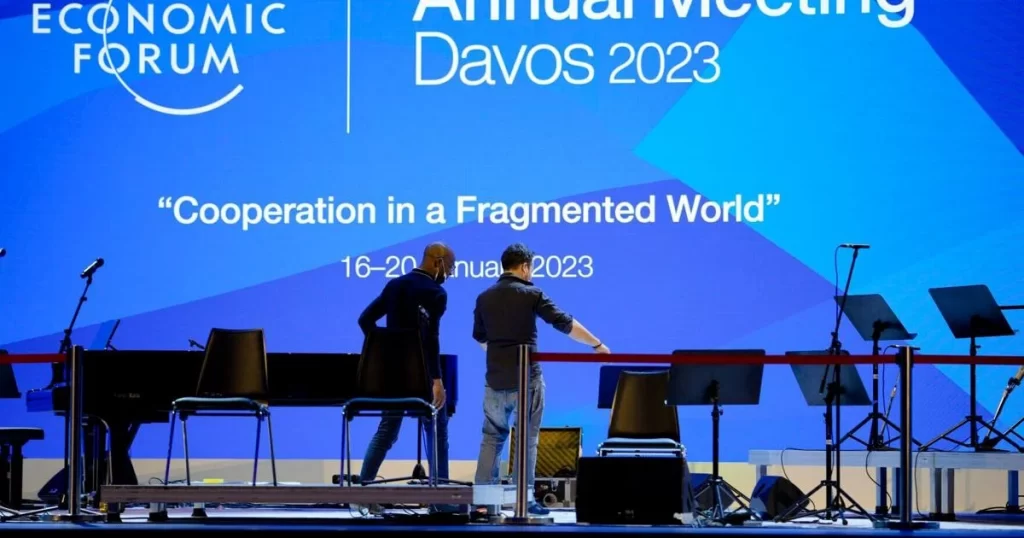Davos, Switzerland/New York, January 18 – While acknowledging that the United States and China are in conflict over various issues, the United Nations said it is “possible” for the two countries to engage on climate, trade and technology to avoid decoupling their economies.
U.N. Secretary-General Antonio told the World Economic Forum in the Swiss Alps resort at Davos that the U.S.-China conflict can cause a “tectonic rift that would create two different sets of trade rules, two dominant currencies, two internets and two conflicting strategies on artificial intelligence.”
Referring to a study by the International Monetary Fund, Guterres said a decoupling of the U.S. and Chinese economies, the world’s two largest, could cut global GDP by a whopping $1.4 trillion.
“But it is possible – indeed essential – for the two countries to have meaningful engagement on climate, trade and technology to avoid the decoupling of economies or even the possibility of future confrontation,” the U.N. chief said.
He said the North-South divide is deepening at the same time while developed countries are unable to grasp the deep frustration of the global south.
Participants at the forum, the first in-person gathering since the pandemic erupted in early 2020, have voiced frustration at global economic slowdown, disrupted supply chains and the on-going Russia-Ukraine war. Guterres said the short-term global economic outlook is “bleak” while inequalities have deepened, costs of living have rapidly increased and the world is still unprepared for the next pandemic.
He called for reforming and building fairness into the global financial system to allow poor countries access to finance and to bridge the divide and restore trust so all countries can embark on meaningful climate action.
IMF: WEF faces Gordian Knot as it tries to prevent fragmented world
“As policymakers and business leaders gather at the World Economic Forum in Davos, they are facing a Gordian knot of challenges,” Kristalina Georgieva, Managing Director of the International Monetary Fund, said in an IMF Blog aimed at the gathering.
“From the global economic slowdown and climate change to the cost-of-living crisis and high debt levels: there is no easy way to cut through it. Added to this are geopolitical tensions that have made it even more difficult to address vital global issues,” she said.
“Indeed, even as we need more international cooperation on multiple fronts, we are facing the specter of a new Cold War that could see the world fragment into rival economic blocs. This would be a collective policy mistake that would leave everyone poorer and less secure.”
The IMF estimates that the cost of fragmentation from recent studies “vary widely” with the longer-term cost of trade fragmentation alone could range from 0.2 percent to almost 7 percent in a severe scenario, which is roughly equivalent to the combined annual output of Germany and Japan. If technological decoupling is added to the mix, some countries could see losses of up to 12 percent of GDP.
Georgieva urged governments to strengthen the international trade system; help vulnerable countries deal with debt and step up climate action as measures against fragmentation.
2023 Davos meeting January 16-20
This year’s World Economic Forum under the theme ‘Cooperation in a Fragmented World’ is drawing 2,700 leaders from 130 countries including 52 heads of state/government.
“Multiple crises are deepening divisions and fragmenting the geopolitical landscape. Leaders must address people’s immediate, critical needs while also laying the groundwork for a more sustainable, resilient world by the end of the decade,” WEF said.
Klaus Schwab, Founder and Executive Chairman of WEF, said, “We see the manifold political, economic and social forces creating increased fragmentation on a global and national level. To address the root causes of this erosion of trust, we need to reinforce cooperation between the government and business sectors, creating the conditions for a strong and durable recovery. At the same time there must be the recognition that economic development needs to be made more resilient, more sustainable and nobody should be left behind.”
WEF said the 53rd annual meeting will focus on solutions and public-private cooperation to tackle the world’s most pressing challenges. “It encourages world leaders to work together on the interconnected issues of energy, climate and nature; investment, trade and infrastructure; frontier technologies and industry resilience; jobs, skills, social mobility and health; and geopolitical cooperation in a multipolar world. Special emphasis is on gender and geographical diversity across all sessions.”
(By J. Tuyet Nguyen)
United Nations correspondent journalists – United Nations correspondent journalists – United Nations correspondent journalists – United Nations journalism articles – United Nations journalism articles – United Nations journalism articles – United Nations News – United Nations News – United Nations News

